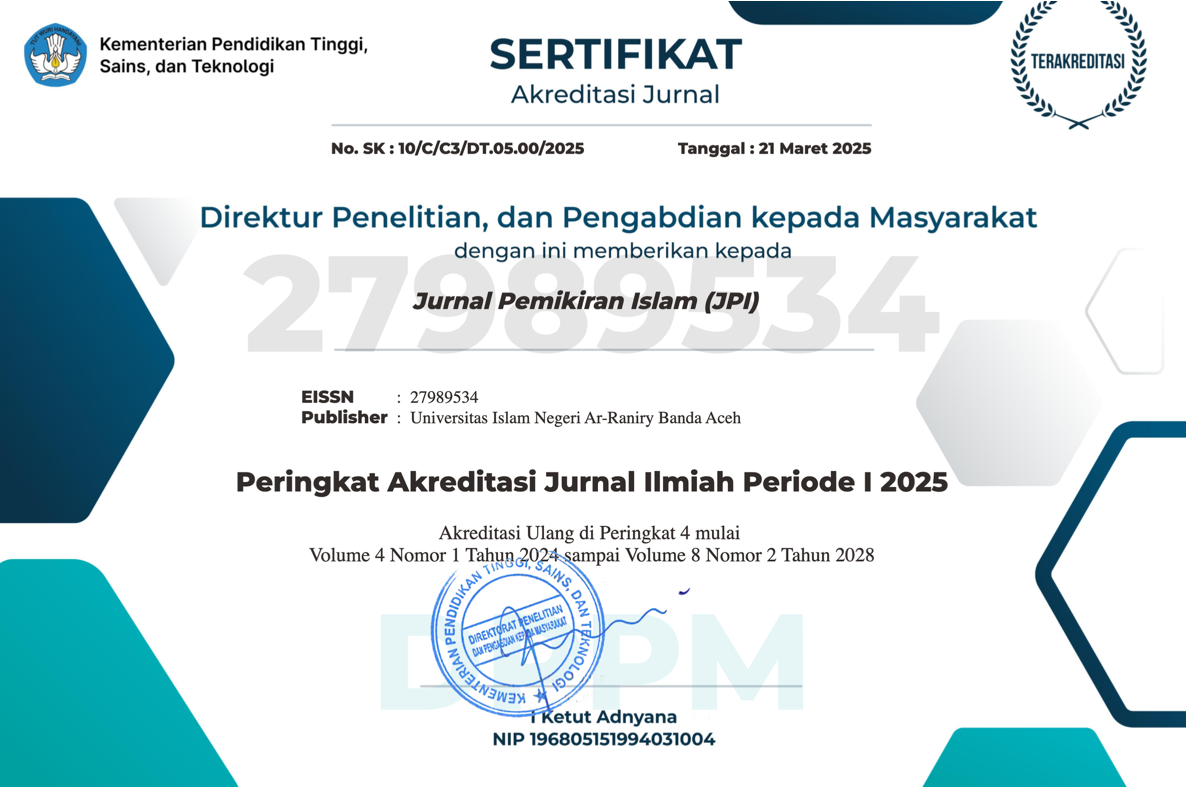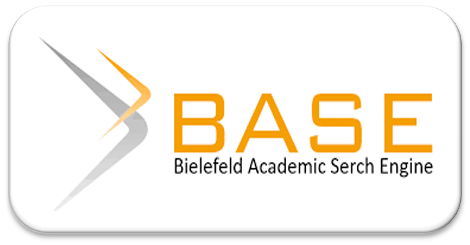Modern Human Essence in the Quran: Comparative Views of Muhammad Iqbal and Plato
DOI:
https://doi.org/10.22373/jpi.v4i1.23221Keywords:
Essence, Humanity, Iqbal, Plato, QuranAbstract
This study explores the essence and dimensions of modern humanity from the perspective of the Quran, focusing on the views of Muhammad Iqbal and Plato. In modern society, there is a prevailing notion that religion and science are irreconcilable entities, complicating the understanding of their relationship. This study aims to analyze the views of Iqbal and Plato on the essence and dimensions of modern humanity. The research method employed is a literature review, utilizing primary data from Iqbal's “The Reconstruction of Religious Thought in Islam” and Plato's “The Republic.” Secondary data include books, journals, essays, and other relevant sources. The findings indicate that Iqbal perceives the essence of humanity in its spiritual entity, complemented by intelligence, belief, and morality, while Plato identifies three essential elements of humanity: spirit, reason (intellect), and desire (appetite).
Downloads
References
Abdul-Baqi, M. F. (1981). Mu`jam al-mufahras li alfaz al-Qur’an al-Karim.
Afrida, A. (2018). Esensi Manusia dalam Perspektif Al-Qur`an. Al-Qisthu: Jurnal Kajian Ilmu-Ilmu Hukum, 16(2), 54. https://doi.org/10.32694/010510
Asy’arie, M. (1991). Konsep manusia sebagai pembentuk kebudayaan dalam al-Qur’an.
Asy’arie, M. (1992). Manusia Pembentuk Kebudayaan Dalam AlQur’an. Lembaga Studi Filsafat Islam (LESFI).
Azmi, M. N., & Zulkifli, M. (2018). MANUSIA, AKAL DAN KEBAHAGIAAN (Studi Analisis Komparatif antara Al-Qur’an dengan Filsafat Islam). Al Qalam: Jurnal Ilmiah Keagamaan Dan Kemasyarakatan, 12(2), 127. https://doi.org/10.35931/aq.v0i0.75
Budiyanti, N., Aziz, A. A., Suhartini, A., Ahmad, N., & Prayoga, A. (2020). Konsep Manusia Ideal: Tinjauan Teologis Dan Pendidikan Islam. Al-Tarbawi Al-Haditsah: Jurnal Pendidikan Islam, 5(2), 43–67. https://doi.org/10.24235/tarbawi.v5i2.6962
Damis, R. (2014). Falsafah Manusia Dalam Al-Qurán. Jurnal Sipakalebbi, 1(2), 201–216.
Dewi, E. (2015). Konsep Manusia Ideal Dalam Perspektif Suhrawardi Al-Maqtul. Substantia, 17(1), 41–54.
Fakih, A., Islam, U., Sultan, N., Hasanuddin, M., Muhajir, M., Islam, U., Sultan, N., Hasanuddin, M., Kultsum, U., Islam, U., Sultan, N., & Hasanuddin, M. (2023). Esensi Manusia Menurut Imam Al-Ghozali Dan. 6(1), 34–46.
Fauhatun, F. (2020). Islam dan Filsafat Perenial: Respon Seyyed Hossein Nasr terhadap Nestapa Manusia Modern. Jurnal Fuaduna : Jurnal Kajian Keagamaan Dan Kemasyarakatan, 4(1), 54. https://doi.org/10.30983/fuaduna.v4i1.2728
Haryati, T. A. (2013). Manusia Dalam Perspektif Soren Kierkegaard Dan Muhammad Iqbal. JURNAL PENELITIAN, 9(1). https://doi.org/10.28918/jupe.v9i1.132
Hidayat, R. (2017). Konsep manusia dalam Al-Qur’an. Almufida, 2(2), 118–133.
Irawati, D., & Musthafa, I. (2021). Konsep Ilmu menurut Az-Zarnuji dalam Kitab Ta’lim Al-Muta’allim dan Urgensinya pada Pendidikan. JIIP - Jurnal Ilmiah Ilmu Pendidikan, 4(8), 931–941. https://doi.org/10.54371/jiip.v4i8.367
Kaelan. (2005). Metode Penelitian Kualitatif bidang Filsafat. Paradigma.
Latief, J. A. (2006). Manusia, filsafat, dan sejarah / Dr. Juraid Abdul Latief, M.Hum (Cet. 1). Bumi Aksara.
Lubis, D. K. (2022). Hakekat Manusia Menurut Muhammad Iqbal dan Kahlil Gibran. Al-Hikmah: Jurnal Theosofi Dan Peradaban Islam, 4(1), 112–121.
Muh. Iqbal. (1981). The Reconstruction of Relegious Thought in Islam.
Nawangsih, E., & Achmad, G. H. (2022). Esensi Manusia dalam Konteks Pendidikan Islam. Edukatif : Jurnal Ilmu Pendidikan, 4(2), 3034–3044. https://doi.org/10.31004/edukatif.v4i2.2650
Othman, M. Y., Rahim, F., Wan Abdullah, W. N., & Zulkarnain, A. R. (2018). Evolusi Konsep Manusia dalam Tasawur Barat. Sains Insani, 3(3), 21–27. https://doi.org/10.33102/sainsinsani.vol3no3.68
Plato. (n.d.). Republic.
Purwanto, Y. (2007). Epistemologi psikologi Islami: dialektika pendahuluan psikologi barat dan psikologi Islami. PT Refika Aditama.
Saepul Anwar. (2006). ( Manusia Dimata Filosuf Dan Al-Qur ’ an Serta Kajian Tentang Inti Manusia ). Jurnal Kajian Pendidikan Agama-Ta’Lim, 4(2), 133–142.
Sayidain, K. G. (1981). Iqbal’s Educational Philosophy (M. . Soelaeman (ed.); cet 4). Bandung : Diponegoro,1981.
Schimmel, A. (2018). Dimensi Mistik Dalam Islam (Edition 4). Pustaka Firdaus.
Syafri, U. A. (2012). Pendidikan Karakter Berbasis Al-Qur’an (cet. 1). Rajawali Pers.
Syahputra, H. (2020). Manusia Dalam Pandangan Filsafat. Al-Hikmah: Jurnal Theosofi Dan Peradaban Islam, 2(1). https://doi.org/10.51900/alhikmah.v2i1.7601
Syati, A. bintu. (2003). Manusia dalam perspektif al-qur’an.
Tanjung, M. (2020). Konsep Manusia Dalam Perspektif Filsafat Pendidikan Islam. An Nadwah, 25(1), 46. https://doi.org/10.37064/nadwah.v25i1.7480
Yusmaliana, D., & Suyadi, S. (2019). Pengembangan Imajinasi Kreatif Berbasis Neurosains dalam Pembelajaran Keagamaan Islam. Edukasia : Jurnal Penelitian Pendidikan Islam, 14(2), 267. https://doi.org/10.21043/edukasia.v14i2.4213
Zulkarnain. (2016). Filsafat Khudi Mohammad Iqbal Dan Relevansinya Terhadap Indonesia Kontemporer. AL-LUBB: Jurnal Pemikiran Islam, 1(1), 1–110.
Downloads
Published
Issue
Section
License
Authors who publish in Jurnal Pemikiran Islam agree to the following terms:
- Authors retain copyright and grant the journal right of first publication with the work simultaneously licensed Attribution-NonCommercial-ShareAlike 4.0 International (CC BY-NC-SA 4.0) that allows others to share the work with an acknowledgment of the work's authorship and initial publication in this journal.
- Authors are able to enter into separate, additional contractual arrangements for the non-exclusive distribution of the journal's published version of the work (e.g., post it to an institutional repository or publish it in a book), with an acknowledgment of its initial publication in this journal.
- Authors are permitted and encouraged to post their work online (e.g., in institutional repositories or on their website) prior to and during the submission process, as it can lead to productive exchanges, as well as earlier and greater citation of published work. (See The Effect of Open Acces)














